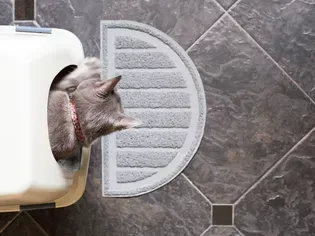Litter Box Problems in Senior Cats Explained (With Solutions)
Updated on 04/26/24

Litter Box Problems in Senior Cats Explained (With Solutions)
As our feline companions age, their needs evolve, and so do their behaviors. Litter box issues are a common concern among senior cats, and understanding the underlying causes is crucial for providing effective solutions. Here's an in-depth guide to help you navigate this challenge and ensure your aging cat's comfort and well-being.
Common Causes of Litter Box Problems in Senior Cats
* Cognitive Decline: Age-related cognitive impairments can affect a cat's ability to remember where the litter box is located or trigger a sudden aversion to using it.
* Arthritic Pain: Arthritis can make it painful for seniors to enter or stay in a low or enclosed litter box.
* Mobility Issues: Difficulty getting in and out of the litter box due to weakness, stiffness, or other mobility challenges can discourage cats from using it.
* Medical Conditions: Urinary tract infections, constipation, diarrhea, and diabetes can cause discomfort or pain associated with using the litter box, leading to avoidance.
* Environmental Changes: Changes in the litter box's placement, type of litter, or cleanliness can stress senior cats, causing them to avoid it.
Solutions for Litter Box Problems
* Cognitive Support: Provide cognitive support supplements or medications prescribed by a veterinarian to improve memory and reduce anxiety.
* Pain Management: Address any underlying pain with prescribed pain relievers or joint supplements.
* Litter Box Accessibility: Choose a litter box with a low entrance and ample space for easy entry and exit. Multiple litter boxes placed in convenient locations can also help.
* Medical Treatment: If a medical condition is causing litter box avoidance, seek prompt veterinary attention to address the underlying issue.
* Environmental Optimization: Keep the litter box in a quiet and private location. Avoid frequent changes in litter type and ensure the box is always clean.
Additional Tips for Managing Litter Box Issues
* Monitor Your Cat's Behavior: Pay attention to changes in your cat's litter box habits and consult a veterinarian if you notice any abnormalities.
* Rule Out Medical Problems: Senior cats should undergo regular veterinary checkups to rule out any underlying medical conditions that may contribute to litter box problems.
* Provide a Safe and Secure Environment: Make sure your cat feels safe and comfortable in its surroundings to reduce stress and anxiety, which can impact litter box use.
* Be Patient and Understanding: It may take time for your senior cat to adjust to changes in its litter box habits. Be patient and provide plenty of support during this transition.
Case Study: A Senior Cat with Litter Box Problems
Bella, a 12-year-old cat, suddenly started avoiding her litter box. After consulting with a veterinarian, it was determined that she had developed arthritis in her hips, making it painful for her to enter and exit her low litter box.
Solution: The veterinarian prescribed pain relievers and recommended a litter box with a low entrance and ample space. Bella's litter box was also placed in a more accessible location. Within a few days, Bella's litter box habits returned to normal, demonstrating the effectiveness of addressing the underlying cause of the problem.
Conclusion
Litter box problems in senior cats can be frustrating for both the cat and its owner. By understanding the common causes and implementing the solutions provided in this guide, you can effectively address this issue and ensure your aging companion's continued comfort and well-being. Remember to consult with a veterinarian to rule out any underlying medical conditions and tailor the approach to your cat's specific needs.
Explore More Pets

Cat Behavior Problems
How to Stop Aggression in Kittens

Long-Haired Cat Breeds
Siberian Cat: Breed Profile, Characteristics, & Care

Cat Behavior Problems
How to Stop Kittens From Scratching and Biting

Long-Haired Cat Breeds
Turkish Angora: Cat Breed Profile, Characteristics & Care

Basic Training
How to Socialize Your Kitten

Short-Haired Cat Breeds
Cute Pictures & Facts About Calico Cats & Kittens

Litter Box Training
Training Your Kitten to Use the Litter Box

Long-Haired Cat Breeds
10 Fun Facts About White Cats